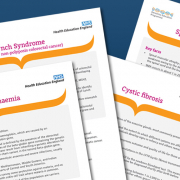
Aimed at primary care health professionals, our factsheets outline the key facts of each condition, plus clinical features, diagnosis, management and treatment.
Alpha-thalassaemia
Alpha-thalassaemia is considered an autosomal recessive disorder, but inheritance is complex because the alpha globin chain production is controlled by two genes: HBA1 and HBA2. There are two clinically significant forms of alpha-thalassaemia: the more severe type is known as haemoglobin Bart’s hydrops fetalis (Hb Bart’s), or alpha-thalassaemia major; the milder form is called haemoglobin H disease (HbH).
- Genetic conditions
Beta-thalassaemia
Beta-thalassaemia is an autosomal recessive condition and is caused by a variant of the beta globin gene.
- Genetic conditions
Classical homocystinuria
Classical homocystinuria (HCU) is an autosomal recessive disorder caused by a deficiency in cystathionine β-synthase (CBS) that results in a defect in the catabolic pathway of the amino acid methionine.
- Genetic conditions
Congenital adrenal hyperplasia 21
Congenital adrenal hyperplasia (CAH) is a group of inherited disorders that result in impaired hormone production from the adrenal glands.
- Genetic conditions
Congenital hypothyroidism
Congenital hypothyroidism (CH) occurs because of defects in the pituitary or thyroid gland, or thyroid hormones, resulting in an absent or underdeveloped thyroid gland (dysgenesis), or a thyroid that cannot make thyroid hormone (dyshormonogenesis).
- Genetic conditions
Cystic fibrosis
Cystic fibrosis (CF) is an autosomal recessive inherited, multisystem condition that is most commonly associated with early death due to progressive lung disease.
- Genetic conditions
Duchenne muscular dystrophy
Duchenne muscular dystrophy (DMD) is a disorder characterised by progressive symmetric muscle weakness commencing in the thighs and pelvis, then extending to other muscles of the body.
- Genetic conditions
Familial adenomatous polyposis
Familial adenomatous polyposis (FAP) is an autosomal dominant condition, resulting in an extremely high risk of colorectal cancer, together with other characteristic manifestations.
- Genetic conditions
Familial hypercholesterolaemia
Familial hypercholesterolaemia (FH) is an autosomal dominant disorder characterised by high levels of serum LDL-cholesterol. If untreated, FH can result in premature coronary artery disease.
- Genetic conditions
Familial medullary thyroid cancer
Familial medullary thyroid cancer (FMTC) is an inherited condition and a subtype of MEN2 (multiple endocrine neoplasia type 2), a hereditary endocrine cancer syndrome. Individuals with FMTC have a high probability of developing medullary thyroid cancer (MTC) with a lower probability (<5%) of developing the other specific endocrine tumours (phaeochromocytoma or parathyroid hyperplasia) usually associated with MEN2.
- Genetic conditions
Familial paraganglioma syndromes
Phaeochromocytomas and paragangliomas are uncommon tumours that affect between one and eight people per million each year. Approximately one in three patients presenting with phaeochromocytomas and/or paragangliomas have a gene mutation associated with familial paraganglioma syndromes.
- Genetic conditions
Developing people
for health and
healthcare


